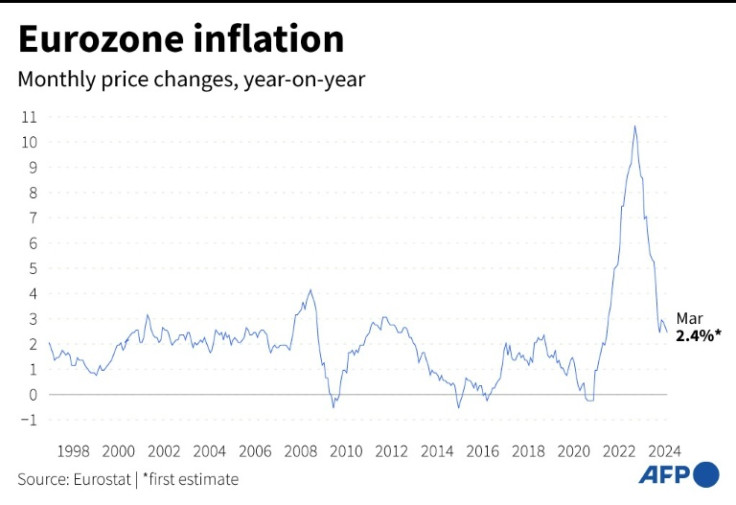
The eurozone's annual rate of inflation dipped further than predicted in March, official data showed Wednesday, spurring hope that the European Central Bank will cut interest rates in June.
Consumer price rises in the single currency area slowed to 2.4 percent, from 2.6 percent in February, the EU's statistics agency said.
Analysts surveyed by FactSet had predicted inflation would remain stable at 2.6 percent while economists asked by Bloomberg expected a smaller drop to 2.5 percent.
The figure is getting closer to the ECB's two-percent target, which will make the case for cutting rates in June stronger, but analysts do not expect a cut at the next monetary policy meeting on April 11.
The Frankfurt-based institution has held rates steady since October 2023 after an aggressive rate-hiking campaign to tame soaring inflation.
Eurozone inflation has significantly fallen from the peak of 10.6 percent reached in October 2022 following Russia's invasion of Ukraine and the subsequent impact on energy costs in Europe.
Core inflation, which strips out volatile energy, food, alcohol and tobacco prices and a key indicator for the ECB, also dipped further than expected to 2.9 percent in March, from 3.1 percent in February.
Analysts for Bloomberg and FactSet had expected core inflation to record a smaller fall to 3.0 percent.
"The fall in both headline and core inflation in March suggests that the ECB is very likely to begin cutting interest rates in June," said Andrew Kenningham of London-based consulting firm Capital Economics.
"While core inflation eased, the stubbornness of services inflation and the desire for the ECB for more wage data makes an April rate cut unlikely," said Rory Fennessy, senior economist at Oxford Economics.
Energy prices in the eurozone also fell, but the 1.8 percent decline last month was much narrower than the 3.7 percent drop in February.
Across the European Union, Lithuania recorded the lowest inflation rate in March, at 0.3 percent, Eurostat data showed.
There was also a welcome slowdown in consumer price rises in the EU's two economic powerhouses, France and Germany.
Germany recorded an annual rate of inflation in March of 2.3 percent, down from 2.7 percent in February.
In France, the inflation reading for March was 2.4 percent, a much smaller figure than the 3.2 percent recorded the previous month.
Other Eurostat data published Wednesday showed the unemployment rate in the single currency area was stable at 6.5 percent in February, the same figure as in January.
Previous data had set the unemployment rate at 6.4 percent in January but the agency revised that figure in Wednesday's release.








